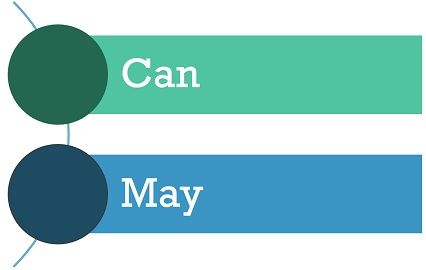Difference Between Can and May
The words can and may are auxiliary verbs, which are often juxtaposed when we talk about possibility or permission. Basically, the word ‘can‘ is used when someone has the ability to do something, or when you are allowed to do something.
On the other hand, may is used to discuss possibility or happenings in the future. It is also used when you want to take or give permission for doing something. Now, let’s move on to our examples to understand the difference between can and may in a better way:
- Can you ride the bike? Or May I ride your bike?
- Joseph can come tomorrow. Or Joseph may come tomorrow.
In this first example, you might have observed that the word ‘can’ is used to know the ability of a person in doing something, whereas ‘may’ is used to ask for the consent. In our next example, both the two discusses the possibility but may represent a strong possibility while can indicates an expectation.
Content: Can Vs. May
Comparison Chart
| BASIS FOR COMPARISON | CAN | MAY |
|---|---|---|
| Meaning | Can refers to the capability of someone in doing something. | May is used in sentence to reflect the possibility or permissibility of something. |
| Permission | Sometimes | Always |
| Context | Informal | Formal |
| Examples | Team A can win this match. | May I go outside? |
| Can you speak clearly? | This may not be true. | |
| Can I have your number? | May I check your bag? |
Definition of Can
The word ‘can’ means ‘be able to,’ it denotes the capability of a person. It is also used for determining the possibility of something or informally ask for permission to do something. Now let’s discuss the usage of can:
- It indicates the ability of a person:
- Can you translate this letter into French?
- She can help us in solving the problem.
- I can do it in the best way.
- To ask for permission:
- You can keep your belongings over there.
- You can take selfies with foreigners.
- Can I get the email ID?
- To request for something:
- Can you pass this message to the manager?
- Please, can I get your notebook for a moment?
- To represent the possibility:
- Can I expect you day after tomorrow?
- If your age is more than 60 years, you can get retirement benefits.
- To give an offer or suggestion:
- Can I bring that book to you?
- Can I play on your behalf?
Definition of May
In English, we use ‘may’ for expressing any kind of possibility, regarding happenings or events that may occur in the future. It is also used to give and take permission to someone to do something. Now, let’s move on to understand its usage, with the help of points given below:
- To represent the possibility:
- The exams may start from the next week.
- She may not like the dress; we brought for her.
- It can be used to seek or receive permission:
- The candidate may bring normal calculators for the exams.
- May I come in, ma’am?
- You may take my book to read
- For wishes and hopes:
- May you achieve new heights of success.
- May you have a happy journey.
- May all your dreams come true.
Key Differences Between Can and May
The points given below are substantial, so far as the difference between can and may is concerned:
- The word ‘can’ and ‘may’ are modal verbs, wherein can is used to denote a person’s ability in doing something or talking about any kind of possibility. On the other hand, may is used to take or give permission to/from another person. Further, it is also used when there is a strong possibility of something.
- Both can and may are used to seek or receive permission, however, may is more usual and formal.
- In general, we use the word can for informally asking for something. Conversely, may is used for formally asking for or allowing something.
Examples
Can
- Can you repair the mobile phone?
- I can call you if you want.
- This can change the way we work.
May
- You may go now.
- May I take your pen?
- You may not use my stuff.

No comments:
Post a Comment